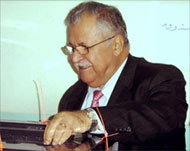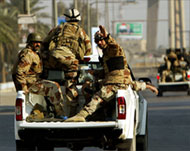Explosions as Iraq votes
Polling stations opened around Iraq to allow Iraqis to vote for a new parliament as several explosions were reported across the country.

From the Gulf to the mountainous borders of Turkey and Iran, voters on Thursday will file to more than 6000 polling stations, ink their fingers to guard against multiple voting and drop their votes into ballot boxes.
A large explosion was head in Baghdad within minutes of the polls opening and sirens could be heard inside the heavily fortified Green Zone where the Iraqi government and the US and British embassies are located.
Police said the explosion was reportedly caused by a mortar landing near the Green Zone. There were no immediate reports of any injuries or damage.
In northern Mosul, where nearly all polling stations opened, a bomb killed a hospital guard and injured two other people when it went off between a polling station and a hospital, Bahaaldin al-Bakri, a doctor at al-Jumhouri hospital, said.
A mortar also landed near a polling station without causing any injuries, initial US military reports said.
Secure but tense
There was also an explosion in Ramadi, a city west of the capital where anti-government fighters are strong, and a mortar round landed near Tikrit, the home town of Saddam Hussein, the ousted president. But overall, voting appeared to begin in a secure, if tense, atmosphere.
At a polling station at Baghdad city hall, in the capital’s Khulani neighbourhood, police officers searched each person entering.
 |
|
President Talabani cast his vote |
To reach the station, people were searched at three checkpoints and dozens of people were standing waiting to vote.
Abdul-Husein Hendawi, a senior official with the election commission, said: “The first voting process to choose a parliament with a four-year term in Iraq has started and all the voting centres in Iraq have opened.”
He said some polling stations in the town of Ramadi, an anti-government stronghold 115km west of Baghdad, had not yet opened for security reasons.
In violence-wracked Anbar province, west of Baghdad, Hendawi said that 162 of 207 electoral centres had opened while in Mosul 520 of the 522 were operating.
Voting also got under way without problem in nearby Falluja and the US military said that a bomb that had been found in a polling station had been neutralised.
Al-Qaida threat
Al-Qaida in Iraq and other Islamist groups have vowed to disrupt the vote but their statements have been more muted in tone than in January, and the run-up to the election has, by Iraq’s standards, been calm.
 |
|
Conservative Shia Muslim parties |
Despite voters having to walk to vote because of security restrictions, turnout is expected to be high – perhaps 70% to 80% compared with 59% in January and 64% in October’s referendum on a new constitution.
There are no reliable opinion polls but observers expect the United Iraqi Alliance (UIA), a grouping of conservative Shia Muslim parties within the current coalition government, to win the most votes.
Its share is expected to fall, however, from the 48% it won in January to perhaps about 40%.
The Kurds, the second-biggest bloc in parliament, are predicted to win about 25% of the vote, and will be pushed hard for second place by Iyad Allawi, a former interim prime minister, whose broad coalition took 14% in January but is expected to make ground.
Big difference
The January ballot was for an interim government charged with overseeing the drafting of a constitution. The charter, approved in a vote in October, paved the way for this week’s full-scale parliamentary election.
The big difference from January is that this time the Sunni Arab minority is largely planning to vote.
One of the first Iraqis to vote on Thursday was Jalal Talabani, Iraq’s first Kurdish president, who cast his ballot in the northern city of Sulaimaniyah.
 |
|
About 150.000 Iraqi soldiers and |
“This is a good day and the Iraqi people bear the responsibility to vote for a better future. I hope that the Iraqi people will stay united. We hope that the people will vote to keep the constitution that was approved by the Iraqi people,” Talabani said.
In Baghdad’s predominantly Sunni Arab Azamiyah district and at al-Nuaman school, security was tight and the street on either side of the building was blocked with cement blocks and razor wire.
About 20 minutes after the polls opened, people began arriving – but in small numbers. Women were not allowed to take their bags inside the centre and cell phones were also banned for security reasons.
There was little enthusiasm at the station for the Shia coalition that has governed the country since 28 April or for Ibrahim al-Jaafari, Iraq’s prime minister and leader of the conservative Shia Dawa party.
Voters’ dilemma
One voter, Khali Ibrahim, 70, said: “We want to choose Sunni candidates. We want then to be in power because they are capable of providing security and they do not kill or beat us. As for al-Jafaari’ government, may they never return. They entered our houses in the middle of the night to arrest and beat our sons.”
 |
|
Former prime minister Allawi is |
He said he was going to vote for the Sunni-oriented Iraqi Islamic Party and Adnan al-Dulaimi. He said he had been “torn” between al-Dulaimi and Iyad Allawi, a secular Shia who served as interim prime minister.
“I was torn between al-Dulaimi and Allawi because Allawi is a secular man who does not differentiate between Sunnis and Shia,” Ibrahim said.
It was a different case outside Baghdad city hall, where 80-year-old Abbasiya Ahmad said she had voted for the governing Shia-dominated United Iraqi Alliance.
“We hope that they will bring us security and safety. Also they are clerics, and clerics do not steal our money. We want people who protect our money,” she said.
Another voter said he preferred Allawi, who is running on a platform calling for national reconciliation. “I am very happy that I voted today and I hope that these elections will bring stability to the country,” the 64-year-old retired civil servant said.
Tight security
At the Arab Banner primary school in the predominantly Shia downtown district of Karradah, Saleh Hadi, a 71-year-old car mechanic who is married with eight children said that “this is what Iraqis want. Democracy, God willing, glory and peace”.
 |
|
Members of the Iraqi diaspora |
Security is tight. About 150,000 Iraqi soldiers and police officers will be on the streets to prevent the bombings and shootings which killed around 40 people on polling day at the 30 January election.
Nearly 160,000 US soldiers are on hand to support Iraq’s security forces, and although they aim to keep their distance from polling booths, they will intervene if needed.
On Wednesday, George W Bush took the blame for going to war in Iraq over faulty intelligence but said he was right to topple Saddam and urged Americans to be patient as Iraqis vote.
“We are in Iraq today because our goal has always been more than the removal of a brutal dictator,” President Bush said, hours before polling stations opened in Iraq.